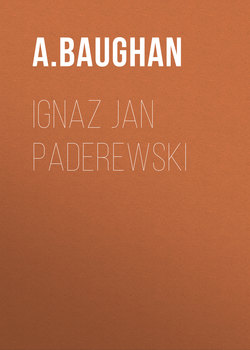Читать книгу Ignaz Jan Paderewski - A. Baughan - Страница 2
II
FROM WARSAW TO PARIS
ОглавлениеIn the fact that a young professor of music, who was not without note in his own circle, should have decided to give himself up to several years of arduous study, we may perhaps find some indication of Paderewski's tenacity of purpose. In 1886, at the age of twenty-six, he placed himself under Leschetitzky's guidance, and for four years he studied with the famous professor and his wife, Madame Essippoff. It is not too much to say that Paderewski has made a brilliant name for his teacher as well as for himself. Of course, Leschetitzky had a big reputation as a teacher long before his famous pupil went to him, but it was not a world-wide reputation, as it now is. Every season we hear pianists in London who proudly emblazon their programmes with "pupil of Leschetitzky"; they are as numerous as the many "pupils of Liszt," and in many cases have as much right to the description. The difficulty is to decide (from the many articles written by his self-styled pupils) what is the method taught by this Viennese magician and it is almost as difficult to draw any clear conclusion from their playing. A consistent and illuminating account of the great teacher and his methods has been given, however, by Miss Hullah in a volume of this series. Leschetitzky has not any hard and fast methods. Mr. Henry C. Lahee, in his "Famous Pianists of To-day and Yesterday," has this to say of the great teacher: "Leschetitzky's method is that of common sense, and is based on keen analytical faculties. He has the genius for seizing on what the finest artists do in their best moments, observing how they do it physically, and, in a sense systematizing it. He has his own ideas of how to train the hand for all that it requires, but he never trains the hand apart from the ear. He has no 'method' except perhaps in the technical groundwork – the grammar of pianoforte playing – and this is taught by his assistants. So long as the effect is produced, he is not pedantic as to how it is done, there being many ways to attain the same end."
In general it may be said that the Leschetitzky pupils have "style." The fault of the school, if one may judge by its exponents, is a desire to be brilliant and startling at all costs. In the case of a player who has no musical individuality of his own, and has acquired technical facility out of all proportion to his musical endowment and general education in the art, the Leschetitzky tuition seems to make for hardness and a perverse brilliancy. Of course Paderewski himself would have been a remarkable player no matter under whom he had studied, but the surety and firmness of technique which Leschetitzky evidently knows how to impart were just what he required. It must not be forgotten, too, that when Paderewski went to Vienna he was practically an artist, an all-round, well-educated musician, who, from the first, had been interested in the historical as well as the poetic side of his art. In addition, need it be said that he was a man of uncommon mind far removed from the type of virtuoso who inspires his soul from the keys of the pianoforte. No teacher and no method can produce the pianist of "genius." The platitude is excusable in the face of the absurd things which have been written concerning the effect of Leschetitzky's teaching.
That Paderewski gained much from it is clear enough from the fact that a year after going to Vienna he made his début there as virtuoso with much success, and from that time onward his progress was gradual until in 1888 he found himself the sensation of Paris. But it was by no means a case of the kind of artistic conquest which the popular novelist invariably describes when writing of musicians. The first recital at the Salle Erard in 1888 was, indeed, but poorly attended, and, except that no performer of genius ever makes his first appearance without his reputation having preceded him among the inner circle of his brother musicians, the début might have fallen as flat as the ordinary recital by an ordinary, unknown pianist. As it happened, both Lamoureux and Colonne, who were present, were so impressed by Paderewski's gifts that both made him an offer to play at the well-known orchestral concerts associated with their names. M. Lamoureux's offer, being made first, was accepted, and the new pianist was thus given an opportunity of performing before an enormous audience. He made his mark immediately, and was invited to play at one of the Conservatoire concerts, a distinction which, no doubt, he fully appreciated. From Paris Paderewski naturally cast his eyes on London, but it was not until May 1890, that he gave his first recital here. Again his triumph was not immediate, in the novelist's sense, and there was certainly some uncertainty in his reception by the critics, but he did triumph in the end.
